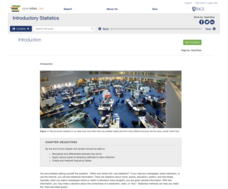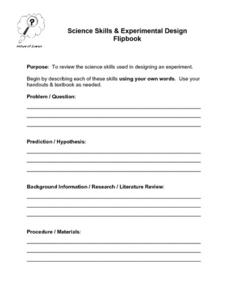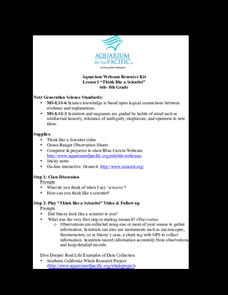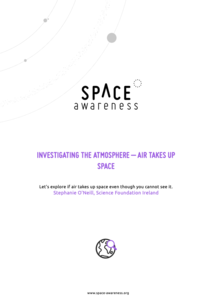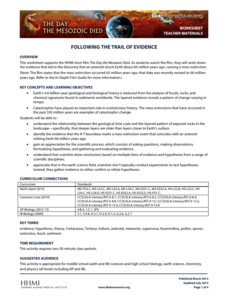Houghton Mifflin Harcourt
Zombie Ants
One of the creepiest and coolest natural occurrences is a great forum for data analysis and discussion! Explore the phenomenon of zombie ants, or ants infected with the Cordyceps fungus, with a series of activities and experiments. Kids...
Rice University
Introductory Statistics
Statistically speaking, the content covers several grades. Featuring all of the statistics typically covered in a college-level Statistics course, the expansive content spans from sixth grade on up to high school. Material comes from a...
Edgemont Elementary School
Scientific Method Unit
Four out of five teenagers experiment with science by accident. This unit teaches the five parts of the scientific method through examples, guided practice, independent practice, and then through a hands-on experiment. Each step is...
Curated OER
Scientific Methods in Biology
In this scientific methods worksheet, students will look at a picture of two different types of mice and create a hypothesis to explain what caused the difference. Then students will write the steps they would take to test their...
Curated OER
Conducting a Scientific Investigation
For this scientific investigation worksheet, students answer 16 questions about conducting a scientific experiment on marble's and their velocity at different ramp heights. Students write a scientific question and then go through the...
Curated OER
Science Skills and Experimental Design
In this experimental design worksheet, students describe the different science skills required when designing an experiment. Then students create a flipbook with the information. This worksheet has 9 short answer questions.
Curated OER
Rubber Band Science
In this physical limits lesson, students test the limits of a rubber band. Students will use various masses to test how far a 1/4 in. rubber band will stretch. They will record and graph their data, then evaluate how the outcome would...
American Psychological Association
A Tasty Sample(r): Teaching about Sampling Using M&M’s
Here's a sweet activity! As part of a study of psychological research methods and statistic gathering, individuals develop a hypothesis about the number of each color of M&Ms in a fun-size package. They then count the number of each...
Curated OER
Testing the Hypothesis
Students create and conduct various experiments to determine the origin of a family artifact, and then determine whether their results were successful. Students summarize their results and evaluate whether their hypotheses were correct.
Teach Engineering
Hydrogen-Oxygen Reaction Lab
High schoolers conduct an experiment using the reaction of hydrogen and oxygen. After pairs balance the chemical equation for making water, they mix different ratios of hydrogen and oxygen in a chemical reaction. Classmates...
Education World
Predicting Pumpkins
If you want more pumpkin seeds, you should get a bigger pumpkin—right? Young harvesters use estimation skills to make a hypothesis about how many seeds they will find in a pumpkin before examining the real number inside.
Bonneville
A Simple Circuit
Heat up a lesson on solar energy by building a circuit for a cooling fan. Given a solar module and a DC motor, scholars develop hypotheses for how to make the fan turn. They test out their hypotheses, and then draw a circuit diagram to...
Polar Trec
Is There Salt in a Glacier?
What can conductivity tell us about a glacier? Groups analyze glacial melt to determine salt content through an analysis of the pH and conductivity measurements of two samples. Groups then determine the source of the salts.
Polar Trec
Do Microorganisms Live in Antarctica?
Can microorganisms live in the dry, cold climate of Antarctica? Young scientists view a research project measuring microorganisms in the Taylor Glacier. They record the findings from dirty ice, clean ice, boots, sediment, and more. Then...
K12 Reader
The Scientific Method
The scientific method is the focus of a reading comprehension exercise that provides readers with a short description of the steps, and then asks them to respond to a series of questions based on the article.
Aquarium of the Pacific
Think Like a Scientist
Scholars watch a video and meet a scientist who is studying sharks as she explains her observations about the sharks and provides her hypothesis to explain their behavior. Learners then act like a scientist as they watch an aquarium...
Flipped Math
Reasoning and Proof
Make sure the conditions are right. Pupils watch a video introducing conditional statements and their related statements. Learners find out how to identify the hypothesis and conclusion as well as write the converse, inverse, and...
Bonneville
Setting Expectations for Science and Engineering Projects
What is science? Sitting in a whole group discussion, scholars first share their ideas on science and how to conduct investigations. They learn about the steps for scientific inquiry and experimentation. Once finished, individuals then...
Newseum
Civil Rights: Knowns and Unknowns
Class members generate a list of research questions to review the civil rights movement and determine what scholars still need to learn. Groups then select a different compelling question, create a hypothesis and find evidence to support...
Howard Hughes Medical Institute
Fact Patterns: A Film Guide
What does it take to create a scientific theory? Learners attempt to answer the question by studying the work of Charles Darwin and Alfred Russel Wallace. While watching a video, they track observations from each scientist and then look...
Space Awareness
Investigating the Atmosphere - Air Takes Up Space
How do you know there is air? Can you see it, smell it, feel it? To begin the investigation, learners watch a video and discuss what they know about air and the atmosphere. Then, they participate in five different hands-on, inquiry-based...
Discovery Education
Motion in the Ocean
How do temperature changes affect ocean currents? Scholars explore convection currents by demonstrating the flow of water in a baking dish. They use ice, heat, and food coloring to see currents. Then, they draw conclusions about their...
Teach Engineering
Statistical Analysis of Flexible Circuits
Scholars connect statistical analysis with flexible electric circuits. They first learn about flexible circuits and their applications through a PowerPoint presentation and then consider how the fabrication process for these circuits...
Howard Hughes Medical Institute
Following the Trail of Evidence
One important skill in analyzing scientific evidence is identifying facts versus opinions. Scholars identify pieces of evidence from the film The Day the Mesozoic Died and then discuss this evidence in small groups at the end of each act...



